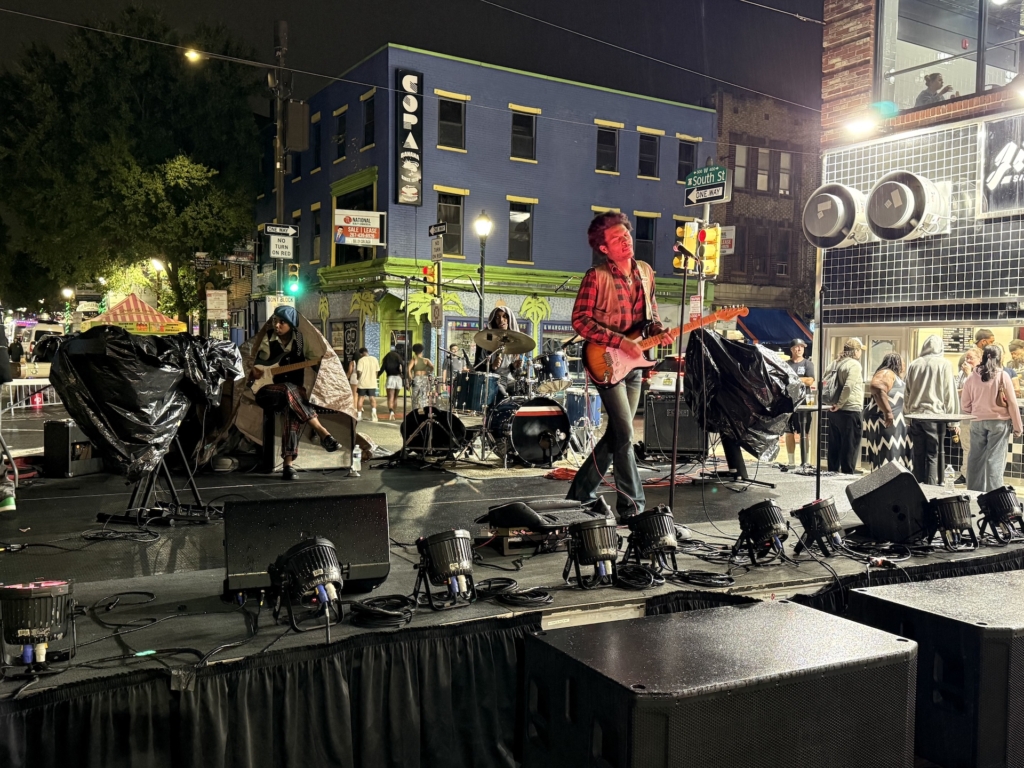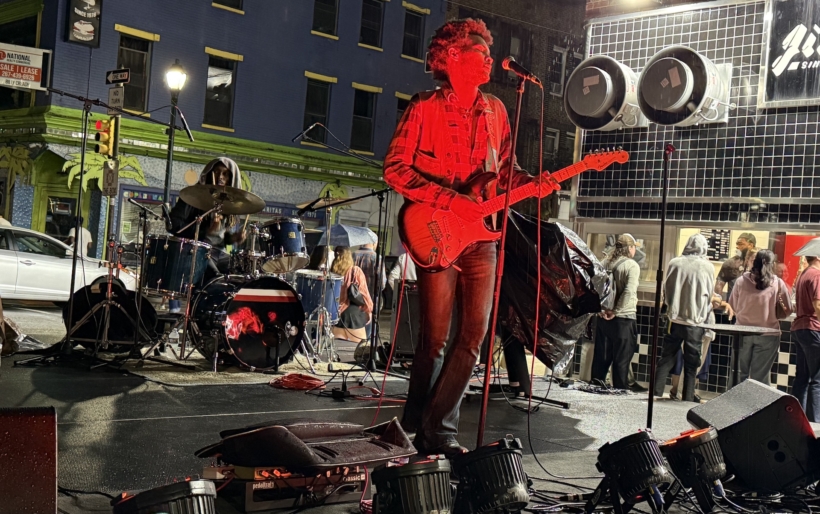
Buddy Red | photo by Abdur Rahman
Buddy Red brings southern rock spirit to Philadelphia
The rising guitarist and singer-songwriter rocked South Street in the rain this weekend, and chatted with us beforehand.
“I’m still reserving judgment,” is Buddy Red’s response when I asked if he still feels like he was born in the wrong era. The young Atlanta rock singer believes he would have found more success as a rock artist in the late ’50s and early ’60s, which inspired his song “1958.” I told him he’s in the right era — one where Black artists like him, Thundercat, Samara Joy, Tanner Adell, and even Atlanta pop-punk group The Paradox are proving they don’t have to be put in a box. They’re showing they can do more than just rap or sing R&B. Buddy’s been contributing to that shift by touring across the country for the past month; he recently returned to the City of Brotherly Love for the MilkBoy End of the Summer Festival, where Philly has shown him nothing but love.
The day before his show, I caught up with Buddy before he made his way to South Street. One thing that still surprises him is how often people recognize him.
“We were just at Reading Terminal and a couple of people stopped me and were like, ‘You, Buddy, who plays the guitar?’” he says. “I was honestly surprised that I walked in and people recognized me. I came here a couple of weeks ago, and I was wondering if they knew who I was before then or after. Like, how fast does word get around town?”
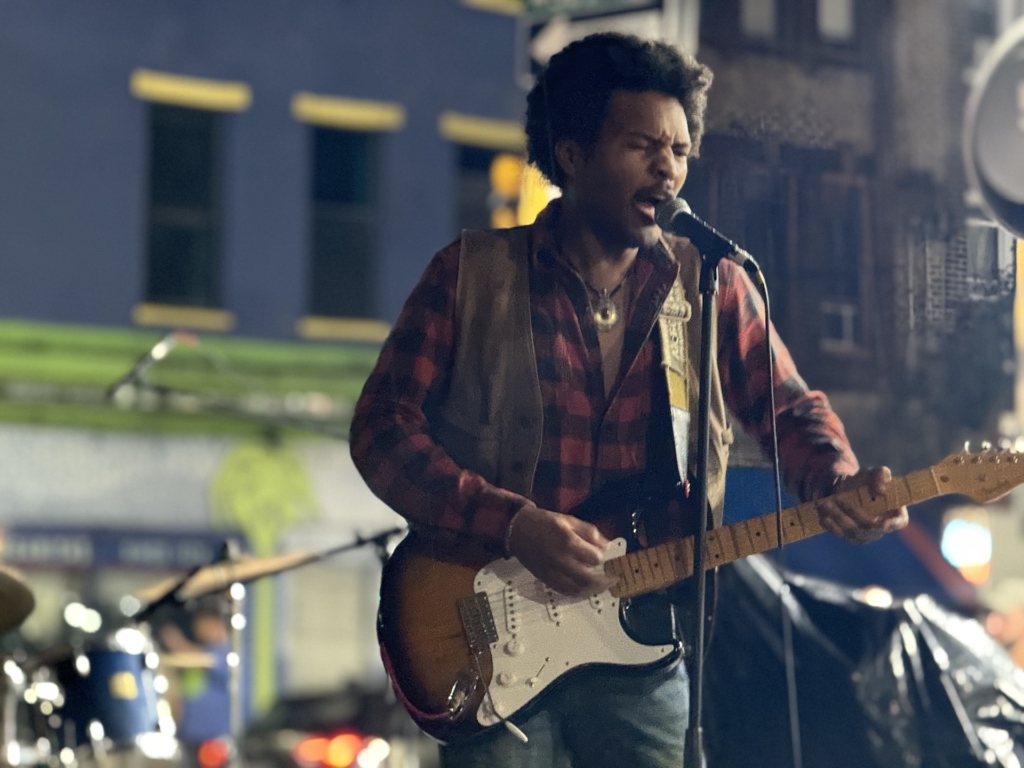
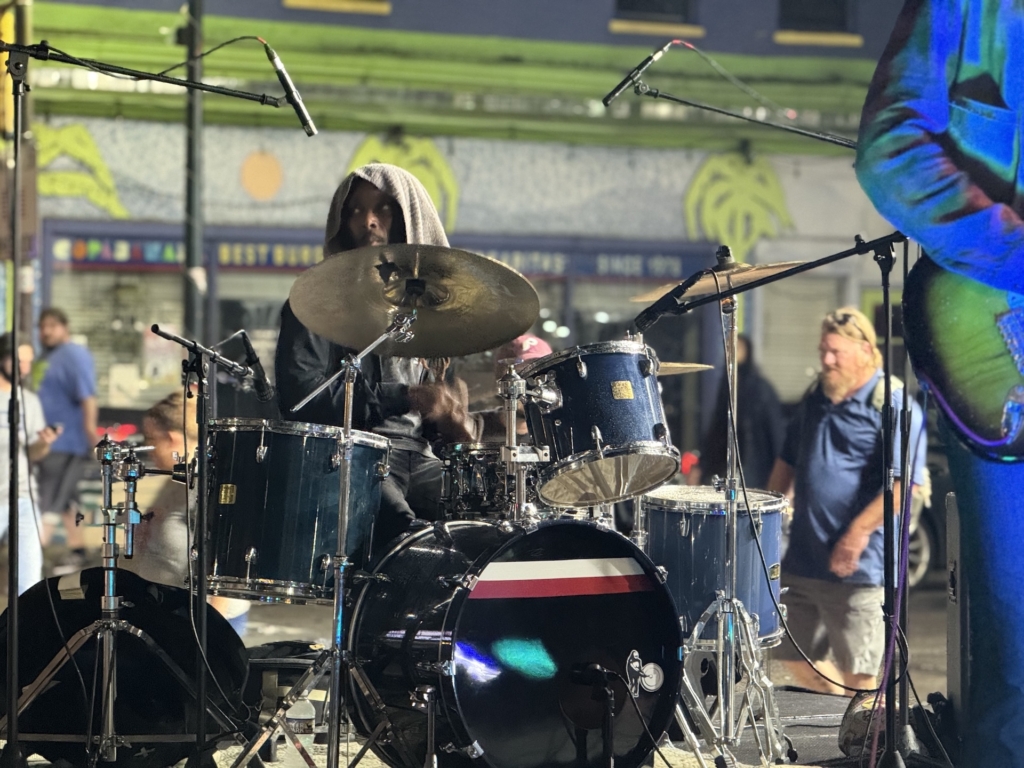
It helps when you have Philly favorites like funk singer Arthur Thomas and hip-hop artist Chill Moody booking you for local fests like Urban Art Fest and the MilkBoy South Street Block Party, plus radio folks who spin your records on air. (*cough*) That network has quickly spread the word about Buddy’s talent.
Before his set, rain began to drizzle down South Philly. It looked like an old-school rock show — Buddy Red and music collective Omar’s Hat getting ready to jam in the rain. But Philly’s love for Buddy kept fans standing in the storm to watch him rock. For many of us, that love stems not just from his music but also from his past as Messiah Harris on VH1’s Family Hustle, created by his father, hip-hop legend T.I.
“That was my first taste of fame and all that good stuff, but I felt like I didn’t deserve it at the time because I didn’t have any real plan for myself,” says Buddy Red. “I was young, but even then Domani knew what he wanted to do. King knew what he wanted to do. Niq Niq knew what she wanted to do. Me, Major, and Dejay are still figuring it out. I was surrounded by examples of people doing what I would soon do.”
Around that time, Buddy knew he wanted to be involved in music but wasn’t sure how. Like his family, he loved music but didn’t see himself becoming an MC like his father or brothers, or a singer like his stepmother or sister. That led him to production.
“Before then, I was frustrated because I knew I loved music — listening to it, piecing it together in my head, picking out certain things in songs — but I didn’t know what to do with that,” he says. “I thought I could either be a singer or a rapper because that was all I was around. It hit me when I was 16, because I started collecting CDs and looking through my favorite songs and the credits. That’s when I discovered the term producer. They were the ones making the music for these rappers. I remember watching a hip-hop video that had the Skandalouz instrumental by 2Pac, remixed for like five seconds, and it was so good. That’s when it hit me — I could do this. The first person I told was my pops.”
Still, producing didn’t fully satisfy his hunger. That changed when he saw the Queen biopic Bohemian Rhapsody.
Watching that movie helped Buddy Red embrace the stage.“Freddie Mercury’s showmanship and his comfort being on stage — I think I took a lot of that subconsciously,” he says. “When I found out he was kind of odd off stage but meant to be there on stage, I interpreted that in my own life. When I’m not on stage, I’m cool and calm, but when I’m up there I do things I wouldn’t normally do — like dancing with a guitar and doing little tricks.”
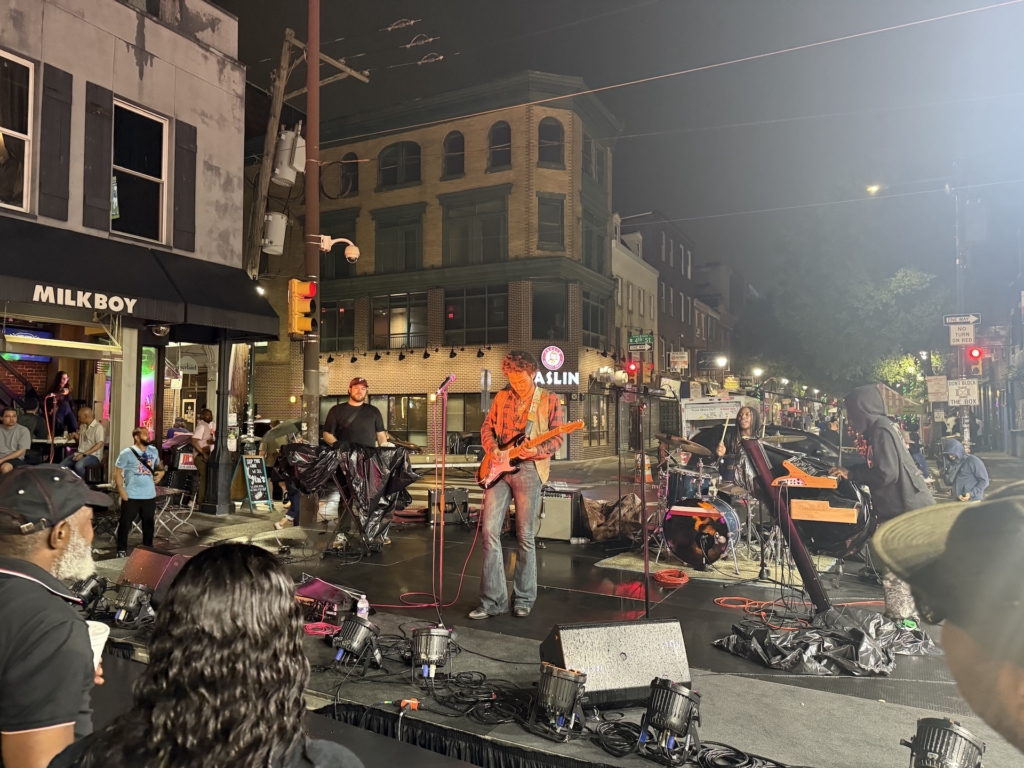
At the MilkBoy block party, Buddy Red played his set with Omar’s Hat — that night featuring pianists Black Buttafly and Max Hoenig, drummer Joseph Cephas, and guitarist Keyanna Hutchinson. It felt like a jam session among talented friends, while Buddy let his guitar do the talking. , Buddy and Omar’s Hat launched into Hendrix’s “Foxy Lady,” and whether playing behind his head, with one hand, or between his legs, Buddy pulled out tricks like he was competing in the X-Games. It showed how much confidence he’s built from touring across the country since performing at Atlanta venue Vinly.
“Man, I’ve grown immensely and I’m so grateful for it,” he says. “I always knew as soon as I started playing guitar and doing open mics in Atlanta that I needed to figure out how to move on stage. By the time I got into my groove, my 15 minutes were up and I had to wait until next week. I was fighting for stage time before this tour. I’ve grown a lot since my first gig, and now I’m more comfortable. A lot of the things I’m doing now I saw myself doing back then, but I couldn’t work myself up to do it.”
Of all his material, Buddy says the crowd connects most with “1958.”
“It’s one of my personal favorites, and I think that’s the one people really like. I’m glad they do.”
The performance also gave shine to Omar’s Hat — drummer Joseph Cephas looked like he went “4th Gear” (for those familiar with the anime One Piece), while Black Buttafly kept her keyboard dry under my umbrella (team player duties!), and Keyanna Hutchinson showed she could shred as hard as Buddy.
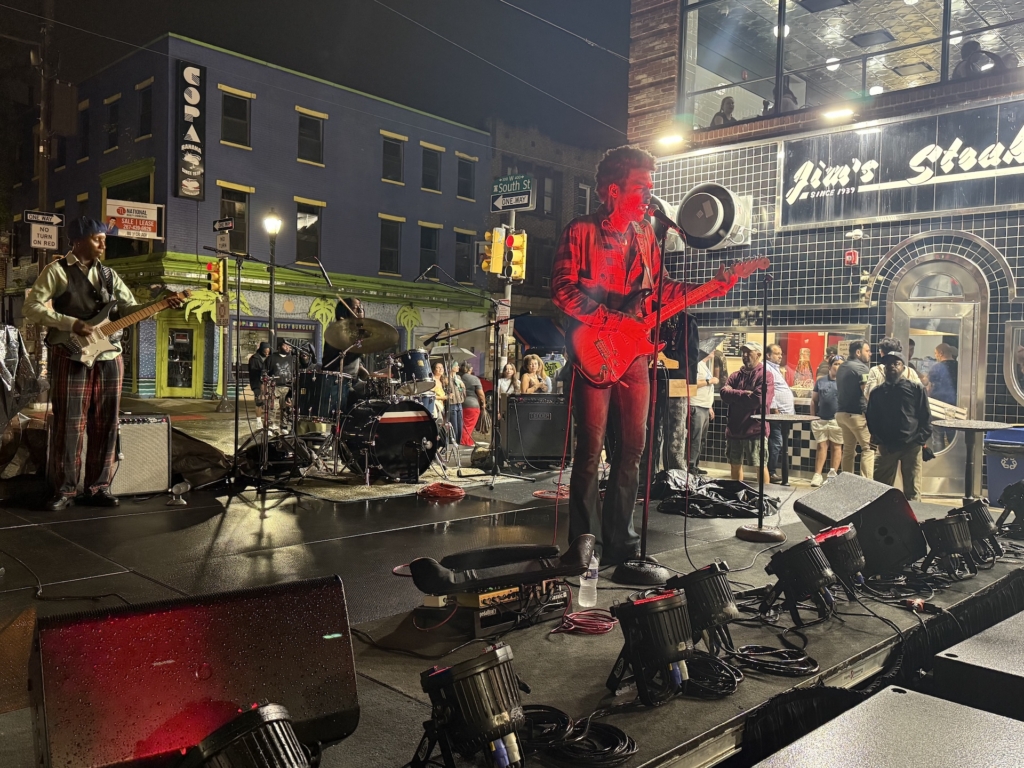
Buddy has noticed something unique about Philly musicians:
“Apparently it’s customary here to do a long solo at the end of your set,” he says. “Last time, when I was about to get off stage, the guy was like, ‘Do a solo.’ I thought he was just in the moment, but apparently that’s how it’s done here. And I ain’t mad at that — I love the solos.”
So it was only right that he closed his set with Queen’s “Dragon Attack,” the band that inspired his rock journey — earning even more Philly love.
I asked Buddy Red to describe how 2025 has been for him, and he chose the word “important.”
“This year has been very important as a musician. I’ve learned how to work with a team and communicate within a team — who does what, who to thank,” he says. “There are still a couple more people I have to add, but the ones I have now have connected me with so many people and opportunities. I even made my first connection in London through my team. I’ve also been on stage more this year than any other year. It has me excited for next year.”
I’m excited too, especially since he shared that The Paradox’s production team told him they loved his music. While there’s no guarantee a collaboration will happen, as a fan of both, I hope the future brings something special.
After two standout shows in Philly, Buddy Red has clearly captured the city’s attention. And with the confidence he’s building on stage, the future looks wide open.
